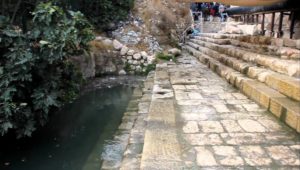POOL OF SILOAM DISCOVERED IN 2004 CONFIRMS JOHN 9:7
The actual location of the Biblical Pool of Siloam has been discovered, confirming the Bible’s authenticity.
“The living and enduring word of God. For, ‘All people are like grass, and all their glory is like the flowers of the field; the grass withers and the flowers fall off, but the word of the Lord endures forever'”—1 Peter 1:24,25 NIV
The more that time passes, the more proof emerges that the Bible is indeed, “the word of God”—1 Thessalonians 2:13
“‘Go,’ he told him, ‘wash in the Pool of Siloam’ (this word means ‘Sent’). So the man went and washed, and came home seeing'”—John 9:7 NIV
“The Pool of Siloam” is just just one of many locations that were once doubted to exist until archaeology confirmed its existence. Until 2004, the pool and church built by Byzantine empress Eudocia to commemorate the site was thought by some Bible believers to have likely been the Pool of Siloam. Also, many “experts” doubted the existence of the Pool of Siloam, period. Many of these “experts” also doubted the authenticity of the entire gospel of John, thinking that it was written by someone other than the apostle John, sometime after the apostle John had died, and was a book of facts, mixed with legend and fiction.

Archaeological discoveries are forcing more and more skeptics to rethink their positions. The actual, genuine, Pool of Siloam that was in use in Jesus day was unexpectedly discovered in 2004. During construction work to repair a large water pipe south of Jerusalem’s Temple Mount, at the southern end of ridge known as the City of David, archaeologists began to uncover what we now know is the Pool of Siloam. Numismatic evidence—coins from the late Hasmonean period (circa 90 BCE) and from the Jewish revolt (circa 63 CE)—prove that this pool was in use in Jesus’ day. This and other evidence has convinced archaeologists beyond any doubt that this was indeed the Pool of Siloam in John 9:7.
The Bible is certainly not dependent upon archaeology to confirm its truth, or its accuracy. However, archaeological discoveries, such as this one, “bring credit to the teaching about God our Savior.” In fact, the entire Bible, like good Christian conduct, also does in a another way (Titus 2:10 GNB).
“Hezekiah stopped the upper outlet for water from Gihon and redirected it underground westward to the City of David”—2 Chronicles 32:30 NAB
An article by Biblical Archaeology Review about the Pool of Siloam can be read below:
The Siloam Pool has long been considered a sacred Christian site, even if the correct identification of the site itself was uncertain. According to the Gospel of John, it was at the Siloam Pool where Jesus healed the blind man (John 9:1–11).
Traditionally, the Christian site of the Siloam Pool was the pool and church that were built by the Byzantine empress Eudocia (c. 400–460 A.D.) to commemorate the miracle recounted in the New Testament. However, the exact location of the original pool as it existed during the time of Jesus remained a mystery until June 2004.
During construction work to repair a large water pipe south of Jerusalem’s Temple Mount, at the southern end of the ridge known as the City of David, archaeologists Ronny Reich and Eli Shukron identified two ancient stone steps. Further excavation revealed that they were part of a monumental pool from the Second Temple period, the period in which Jesus lived. The structure Reich and Shukron discovered was 225 feet long, with corners that are slightly greater than 90 degrees, indicating a trapezoidal shape, with the widening end oriented toward Tyropoeon valley.
The Siloam Pool is adjacent to the area in the ancient City of David known as the King’s Garden and is just southeast of the remains of the fifth-century church and pool traditionally believed to be the sacred Christian site.
What was the function of the Siloam Pool during Jesus’ time? Because the pool is fed by waters from the Gihon Spring, located in the Kidron Valley, the naturally flowing spring water would have qualified the pool for use as a mikveh for ritual bathing. However, it could also have been an important source of fresh water for the inhabitants on that part of the city. One scholar has even suggested that it was a Roman-style swimming pool. Whatever its original purpose, the Siloam Pool where Jesus healed the blind man is an important Christian site, and its discovery represents a watershed moment in the field of Biblical archaeology.
As with many sites in the Holy Land, the origins of the Siloam Pool reach back even further in history—at least seven centuries before the time of Jesus. Judah’s King Hezekiah (late eighth century B.C.) correctly anticipated a siege against Jerusalem by the Assyrian monarch Sennacherib.
To protect the city’s water supply during the siege, Hezekiah undertook a strategic engineering project that would be an impressive feat in any age: He ordered the digging of a 1,750-foot tunnel under the City of David to bring water from the Gihon Spring, which lay outside the city wall, inside the city to a pool on the opposite side of the ridge. In the years that followed, “Hezekiah’s Tunnel” continued to carry fresh water to this section of Jerusalem, and different pools were built here over the centuries, including the Second Temple pool that Jesus knew.
SOURCE: https://www.biblicalarchaeology.org/daily/biblical-sites-places/biblical-archaeology-sites/the-siloam-pool-where-jesus-healed-the-blind-man